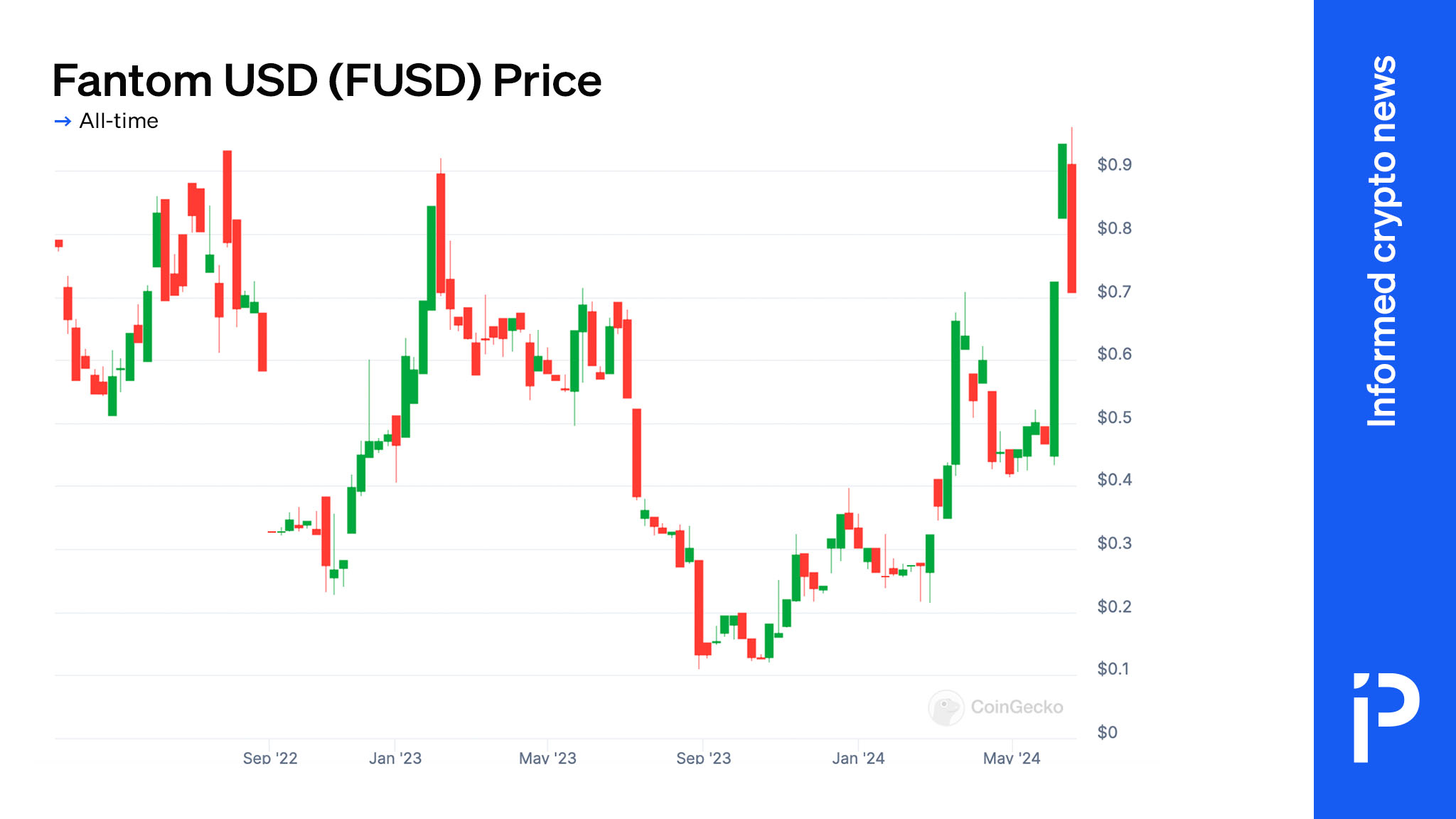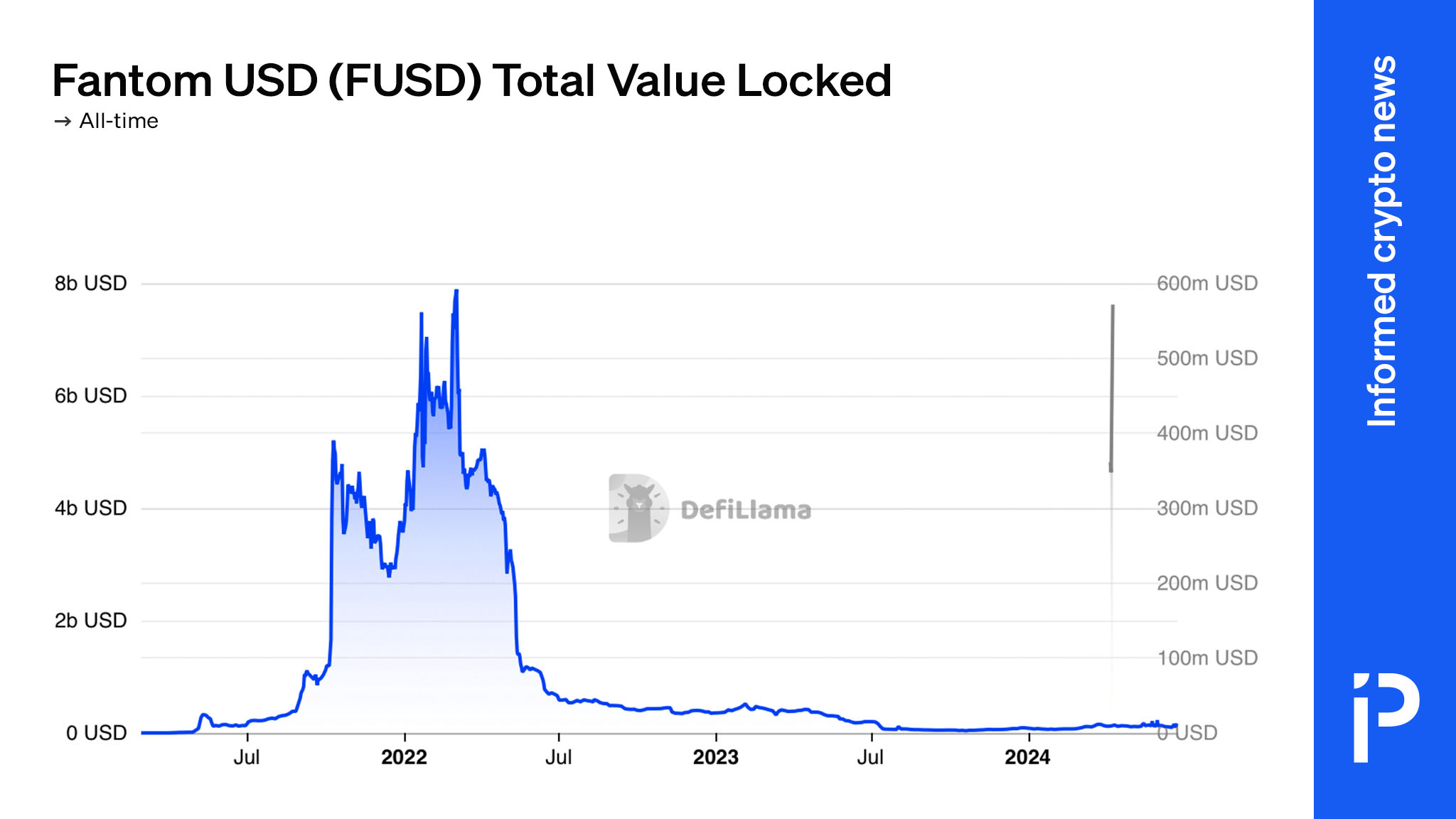A self-described Fantom maximalist has alleged that ‘loyal, OG stakers’ of at least 200 million fantom tokens (FTM) experienced a forced liquidation to the benefit of the Fantom Foundation. He somehow claimed to have found ‘the biggest rug pull on Fantom ever’ even though he offered no blockchain evidence.
As if the story wasn’t difficult enough to believe, he further claimed that this ‘rug pull’ was funding Fantom’s assistance of an entirely new blockchain, Sonic.
To start, there are a few things that are certainly true, without the above conjecture. Fantom is indisputably committed to a new blockchain, Sonic. Furthermore, Fantom is pegging FTM with a 1:1 convertibility promise for S, Sonic’s new proprietary token. The well-funded Fantom Foundation is also contributing 200 million FTM and promising a 100 million airdrop of S tokens to hype the launch.
Fantom ‘stable’ coin doubles in price overnight
Returning to the Fantom maxi’s incredible story, they claim it all started with Fantom’s not-so-stable stablecoin FUSD, which has been worth anything but $1 for years. Trading wildly between $0.18 and $0.97, FantomUSD is the center of the controversy.
Because most FTM token holders staked FTM via Fantom’s default staking protocols, some of which supported the price of FUSD, stakers who bet on the price of FUSD when it was closer to $1 have been penalized with liquidations over the years as the price of FUSD has thrashed much lower.
Specifically, on June 5, when Fantom announced a change in support from FUSD to a bridged version of Coinbase’s stablecoin, USDC.E, FUSD was trading below $0.45. In support of the transition to USDC.E (which was actually worth $1), Fantom leaders announced an incentive to allow borrowers against FUSD to repay their borrowings with USDC.E.

This bullish announcement doubled the price of FUSD north of $0.95 overnight. While great for FUSD token holders, it was catastrophic for FUSD borrowers, who suddenly had to repay double the amount of collateral to repay FUSD.
The most popular type of collateral borrowed against FUSD was, of course, Fantom’s own FTM. This, in the opinion of one Fantom maxi, was a de facto and off-blockchain ‘forced liquidation’ of FTM stakers.
The ‘liquidation,’ which doesn’t have blockchain evidence because it occurred merely as a pricing scheme, underscored ‘the fUSD disaster, which was a major mistake by the FTM team,’ according to the theorist.
Zooming out reveals more liquidation
In the end, whether or not one believes this narrative, whether FTM token holders were liquidated to the benefit of the Fantom Foundation or to the benefit of earlier sellers is merely semantics.
The unfortunate reality for Fantom is that it has lost 98% of its locked assets since its peak — and the price of FTM has only fared mildly better over the years. Ultimately, whether by liquidation or a steady decline in price, most of Fantom’s value transferred from FTM bagholders to sellers in February 2022.
For context, the Fantom blockchain first gained popularity after Avalanche developer Daniele Sestagalli and his partner Andre Cronje endorsed it in late 2021. At the time, the two men were in the process of building their largest, doomed project: Wonderland.
Wonderland, an ultra-high yield DeFi project that boasted a time-to-Lamborghini calculator on its homepage, is down 99.9% from its peak in January 2022. Sestagalli eventually admitted that he concealed the involvement of Omar Dhanani, a.k.a. Michael Patry, a.k.a. 0xSifu in managing Wonderland’s treasury. Dhanani was a co-founder of QuadrigaCX, a failed Canadian crypto exchange.
Read more: Wonderland leader should’ve never trusted Michael Patryn with $1B crypto
Frog Nation: A community of losers
Wonderland was part of a collection of Sestagalli’s and Cronje’s so-called ‘Frog Nation’ projects that have destroyed incredible sums of money for its members.
- Popsicle Finance (ICE) is down 99% from its all-time high.
- Abracadabra (SPELL) is down 98% from its all-time high.
- Betswap (BSGG) is down 99% from its all-time high.
- Wonderland (wMEMO) is down 99.9% from its all-time high.
- Yearn Finance is down 93% from its all-time high.
Fantom has fared no better. Sestagalli called for ‘Fantom Season’ in January 2022 — a few weeks before Fantom’s peak valuation, of course. After peaking near $8 billion in total value locked (TVL) around March 1, 2022, Fantom’s TVL is down 98% to under $140 million today. FTM has lost two-thirds of its value over the same period.

This week’s allegation, however bombastic, of a supposed off-blockchain liquidation via a USDC.E-for-FUSD repayment pricing scheme only adds insult to Fantom’s community members’ existing injuries.
A self-described Fantom maximalist has alleged that ‘loyal, OG stakers’ of at least 200 million fantom tokens (FTM) experienced a forced liquidation to the benefit of the Fantom Foundation. He somehow claimed to have found ‘the biggest rug pull on Fantom ever’ even though he offered no blockchain evidence.
As if the story wasn’t difficult enough to believe, he further claimed that this ‘rug pull’ was funding Fantom’s assistance of an entirely new blockchain, Sonic.
To start, there are a few things that are certainly true, without the above conjecture. Fantom is indisputably committed to a new blockchain, Sonic. Furthermore, Fantom is pegging FTM with a 1:1 convertibility promise for S, Sonic’s new proprietary token. The well-funded Fantom Foundation is also contributing 200 million FTM and promising a 100 million airdrop of S tokens to hype the launch.
Fantom ‘stable’ coin doubles in price overnight
Returning to the Fantom maxi’s incredible story, they claim it all started with Fantom’s not-so-stable stablecoin FUSD, which has been worth anything but $1 for years. Trading wildly between $0.18 and $0.97, FantomUSD is the center of the controversy.
Because most FTM token holders staked FTM via Fantom’s default staking protocols, some of which supported the price of FUSD, stakers who bet on the price of FUSD when it was closer to $1 have been penalized with liquidations over the years as the price of FUSD has thrashed much lower.
Specifically, on June 5, when Fantom announced a change in support from FUSD to a bridged version of Coinbase’s stablecoin, USDC.E, FUSD was trading below $0.45. In support of the transition to USDC.E (which was actually worth $1), Fantom leaders announced an incentive to allow borrowers against FUSD to repay their borrowings with USDC.E.

This bullish announcement doubled the price of FUSD north of $0.95 overnight. While great for FUSD token holders, it was catastrophic for FUSD borrowers, who suddenly had to repay double the amount of collateral to repay FUSD.
The most popular type of collateral borrowed against FUSD was, of course, Fantom’s own FTM. This, in the opinion of one Fantom maxi, was a de facto and off-blockchain ‘forced liquidation’ of FTM stakers.
The ‘liquidation,’ which doesn’t have blockchain evidence because it occurred merely as a pricing scheme, underscored ‘the fUSD disaster, which was a major mistake by the FTM team,’ according to the theorist.
Zooming out reveals more liquidation
In the end, whether or not one believes this narrative, whether FTM token holders were liquidated to the benefit of the Fantom Foundation or to the benefit of earlier sellers is merely semantics.
The unfortunate reality for Fantom is that it has lost 98% of its locked assets since its peak — and the price of FTM has only fared mildly better over the years. Ultimately, whether by liquidation or a steady decline in price, most of Fantom’s value transferred from FTM bagholders to sellers in February 2022.
For context, the Fantom blockchain first gained popularity after Avalanche developer Daniele Sestagalli and his partner Andre Cronje endorsed it in late 2021. At the time, the two men were in the process of building their largest, doomed project: Wonderland.
Wonderland, an ultra-high yield DeFi project that boasted a time-to-Lamborghini calculator on its homepage, is down 99.9% from its peak in January 2022. Sestagalli eventually admitted that he concealed the involvement of Omar Dhanani, a.k.a. Michael Patry, a.k.a. 0xSifu in managing Wonderland’s treasury. Dhanani was a co-founder of QuadrigaCX, a failed Canadian crypto exchange.
Read more: Wonderland leader should’ve never trusted Michael Patryn with $1B crypto
Frog Nation: A community of losers
Wonderland was part of a collection of Sestagalli’s and Cronje’s so-called ‘Frog Nation’ projects that have destroyed incredible sums of money for its members.
- Popsicle Finance (ICE) is down 99% from its all-time high.
- Abracadabra (SPELL) is down 98% from its all-time high.
- Betswap (BSGG) is down 99% from its all-time high.
- Wonderland (wMEMO) is down 99.9% from its all-time high.
- Yearn Finance is down 93% from its all-time high.
Fantom has fared no better. Sestagalli called for ‘Fantom Season’ in January 2022 — a few weeks before Fantom’s peak valuation, of course. After peaking near $8 billion in total value locked (TVL) around March 1, 2022, Fantom’s TVL is down 98% to under $140 million today. FTM has lost two-thirds of its value over the same period.

This week’s allegation, however bombastic, of a supposed off-blockchain liquidation via a USDC.E-for-FUSD repayment pricing scheme only adds insult to Fantom’s community members’ existing injuries.





